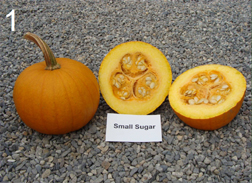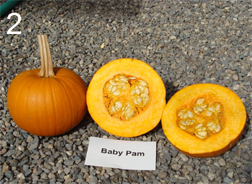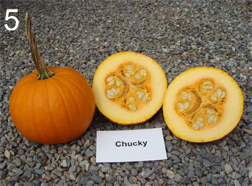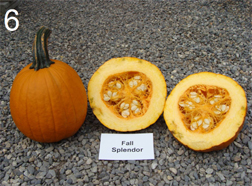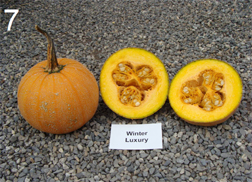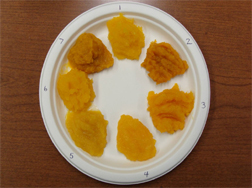Performance of Small-Fruited Pumpkin Cultivars in Maine
University of Maine Highmoor Farm
52 U.S. Route 202
Monmouth, Maine 04259-0179
David T. Handley (david.handley@maine.edu), Mark G. Hutton and Gregory J. Koller, University of Maine Cooperative Extension and Maine Agricultural and Forestry Experiment Station
Abstract
A small-fruited (2-4 lb.) or “pie” type pumpkin variety trial was established in the spring of 2009 at Highmoor Farm in Monmouth, ME. Three replications of seven varieties were direct-seeded on 18 June through black plastic mulch. Plots were 18 feet long with three feet between plants and six feet between rows. All fertilizer was applied according to soil test recommendations and incorporated prior to mulch application and seeding. Fruit was harvested on 18 September. Top performing varieties in terms of yield per plot included ‘Chucky’, ‘Small Sugar’, and ‘Field Trip’. ‘Fall Splendor’ produced the largest fruit in the trial, followed by ‘Winter Luxury’ and ‘Mystic Plus’. ‘Field Trip’ and ‘Fall Splendor’ had the highest stem quality in the trial and ‘Field Trip’, ‘Mystic Plus’ and ‘Fall Splendor’ were rated highest for exterior color and ribbing. The results of this trial suggest that ‘Field Trip’, ‘Mystic Plus’ and ‘Fall Splendor’ offer very high-quality fruit with acceptable yields for pie-type pumpkins, while ‘Chucky’ offers acceptable fruit quality and very high yields.
Introduction
Pumpkins are an important crop to small and diversified farmers in New England, providing substantial profit potential for the fall and Halloween markets. Although large (10-30 lb.) Jack O’Lantern types tend to dominate the market, there is also strong demand for smaller (2-5 lb.) “pie” type fruit, both for their more compact size and for their perceived flesh quality for pie filling. This demand appears to be increasing as interest in locally produced food increases. Several new small-fruited pumpkin varieties have recently been introduced, and there has been an interest in re-evaluating heirloom varieties to increase the diversity of pumpkins available to consumers.
Materials and Methods
The trial was established at Highmoor Farm, part of the Maine Agricultural and Forestry Experiment Station, in Monmouth, Maine. The site has a silt loam soil, which was amended with 10-10-10 fertilizer at a rate of 500 lb./acre and incorporated prior to planting and application of black plastic mulch. Three replications of seven pumpkin varieties were direct-seeded in a randomized complete block design on June 18. Plots were 18 feet long with three feet between plants (six plants/plot) and six feet between rows. The treatments included: 1. Small Sugar; 2. Baby Pam; 3. Mystic Plus; 4. Field Trip; 5. Chucky; 6. Fall Splendor; 7. Winter Luxury. Fruit were harvested on September 18. Data was subjected to Analysis of Variance and mean separation using the test for Least Significant Difference.
Results and Discussion
The variety ‘Chucky’ produced significantly more fruit than any other variety in the trial, with the exception of ‘Small Sugar’ (Table 1). There were no significant differences in fruit number per plot among the other varieties, although the range was considerable. ‘Fall Splendor’ and ‘Winter Luxury’ produced the largest fruit in the trial by weight, followed by ‘Mystic Plus’ and ‘Field Trip’. ‘Chucky’ and ‘Baby Pam’ produced the smallest fruit. Fruit height and diameter data indicate that ‘Field Trip’ was the widest variety, with the most flattened-shape, typically associated with pie-type pumpkins. ‘Baby Pam’ and ‘Mystic Plus’ also had more flattened shapes, while ‘Winter Luxury’ and ‘Fall Splendor’ tended to be more rounded. Long stems are considered an important quality attribute for pumpkins, despite the fact that they tend to break and can injure fruit during transport and storage. ‘Field Trip’ and ‘Fall Splendor’ had the longest stems in the trial, with ‘Small Sugar’, ‘Baby Pam’ and ‘Chucky’ having the shortest stems, although the latter was not significantly different from ‘Winter Luxury’ and ‘Mystic Plus’.
Fruit quality parameters were rated on a 1 to 5 scale with 5 being the darkest, deepest and/or generally the most desirable. ‘Mystic Plus’, ‘Field Trip’, and ‘Fall Splendor’ were rated highest for exterior color, maturing to a uniform, deep orange. ‘Baby Pam’ and ‘Winter Luxury’ were the lightest colored varieties in the trial. ‘Winter Luxury’, an heirloom variety, had a whitish russeting covering much of the fruit. ‘Field Trip’ and ‘Fall Splendor’ were rated highest for ribbing, i.e. they had the deepest sutures on the fruit, which we considered to be a desirable trait. ‘Winter Luxury’ had the least noticeable ribbing. Taking all visual parameters into account, the overall highest rated varieties were ‘Field Trip’, ‘Mystic Plus’, and ‘Fall Splendor’. ‘Chucky’ and ‘Baby Pam’ also rated well overall, while ‘Small Sugar’ and ‘Winter Luxury’ were given the lowest overall visual ratings. Processed (cooked) interior flesh color was also evaluated (Figure 2, data not shown). The darkest color tended to be the most preferred, leading to ‘Winter Luxury’, ‘Baby Pam’ and ‘Mystic Plus’ receiving higher interior color ratings than other varieties.
The results of this trial suggest that the varieties ‘Field Trip’, ‘Mystic Plus’ and ‘Fall Splendor’ offer very high-quality fruit with acceptable yields for small-fruited pumpkins. ‘Chucky’ offers very high yields of smaller fruit with acceptable fruit quality. ‘Baby Pam” and ‘Winter Luxury’ rated relatively low for yield and visual appeal in this trial, but appear to have good qualities for processing.
| Table 1. Small-fruited pumpkin cultivar yield performance in Monmouth, Maine, 2009. | ||||||||
|---|---|---|---|---|---|---|---|---|
| Cultivar | No. fruit/plot | Avg. fruit wt (kg) | Diameter (cm) | Height (cm) | Stem Length (cm) | Color1 | Ribbing1 | Overall Rating1 |
| Chucky | 40 | 1.57 | 49.3 | 14.3 | 9.6 | 3.7 | 3.0 | 3.7 |
| Small Sugar | 29 | 1.97 | 53.7 | 15.6 | 9.3 | 2.5 | 2.7 | 2.8 |
| Field Trip | 26 | 2.38 | 62.6 | 15.6 | 16.4 | 4.2 | 3.8 | 4.7 |
| Mystic Plus | 22 | 2.60 | 60.0 | 16.9 | 10.1 | 4.2 | 3.0 | 4.2 |
| Fall Splendor | 18 | 3.15 | 61.7 | 19.4 | 14.5 | 4.0 | 3.8 | 4.0 |
| Baby Pam | 17 | 1.71 | 50.6 | 13.7 | 9.3 | 3.2 | 2.8 | 3.3 |
| Winter Luxury | 16 | 2.90 | 59.6 | 17.5 | 11.2 | 2.0 | 2.0 | 2.2 |
| LSD 0.05 | 14 | 0.26 | 3.0 | 1.2 | 3.1 | 0.8 | 0.5 | 1.1 |
1Ratings were made on a visual scale of 1 to 5, with 5 being the darkest color, deepest ribbing or highest overall quality.
Figure 1. Fruit characteristics of seven small-fruited pumpkin cultivars in Monmouth, Maine.
- 1. Small Sugar: Overall quality rank: 6th; high yielding, small, flattened fruit with short stems, light color, shallow ribbing
- 2. Baby Pam: Overall quality rank: 5th; low yield, small, slightly flattened fruit with short stems, light color, moderate ribbing
- 3. Mystic Plus: Overall quality rank: 2nd; good yield, larger, slightly flattened fruit with moderate stem length, dark color, moderate ribbing
- 4. Field Trip: Overall quality rank: 1st; good yield and size, flattest fruit with longest stems, dark color, deep ribbing
- 5. Chucky: Overall quality rank: 4th; highest yield, smallest fruit, slightly flattened with short stems, good color, moderate to good ribbing
- 6. Fall Splendor: Overall quality rank: 3rd; moderate yield, largest fruit, rounded with long stems, good color, good ribbing
- 7. Winter Luxury: Overall quality rank: seventh; lowest yield, large fruit, rounded with longer stems, poor skin color with russeting, very slight ribbing
- Cooked Pumpkin Flesh Color: 1.) Small Sugar; 2.) Baby Pam; 3.) Mystic Plus; 4.) Field Trip; 5.) Chucky; 6.) Fall Splendor; 7.) Winter Luxury

